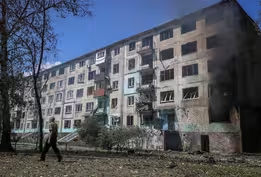
Netanyahu lashes out at critics of plan to occupy Gaza City
Clip: 8/10/2025 | 6m 20sVideo has Closed Captions
Netanyahu lashes out at critics of plan to occupy Gaza City as condemnation mounts
In the face of mounting international condemnation, Israeli Prime Minister Netanyahu defended his plan for a military occupation of Gaza City. At a news conference Sunday, he lashed out at what he called a “global campaign of lies,” while the U.N. Security Council gathered for an emergency meeting on Gaza. John Yang speaks with The Economist’s Israel correspondent Anshel Pfeffer for more.
Problems playing video? | Closed Captioning Feedback
Problems playing video? | Closed Captioning Feedback
Major corporate funding for the PBS News Hour is provided by BDO, BNSF, Consumer Cellular, American Cruise Lines, and Raymond James. Funding for the PBS NewsHour Weekend is provided by...

Netanyahu lashes out at critics of plan to occupy Gaza City
Clip: 8/10/2025 | 6m 20sVideo has Closed Captions
In the face of mounting international condemnation, Israeli Prime Minister Netanyahu defended his plan for a military occupation of Gaza City. At a news conference Sunday, he lashed out at what he called a “global campaign of lies,” while the U.N. Security Council gathered for an emergency meeting on Gaza. John Yang speaks with The Economist’s Israel correspondent Anshel Pfeffer for more.
Problems playing video? | Closed Captioning Feedback
How to Watch PBS News Hour
PBS News Hour is available to stream on pbs.org and the free PBS App, available on iPhone, Apple TV, Android TV, Android smartphones, Amazon Fire TV, Amazon Fire Tablet, Roku, Samsung Smart TV, and Vizio.
Providing Support for PBS.org
Learn Moreabout PBS online sponsorshipJOHN YANG: Good evening.
I'm John Yang.
In the face of mounting international condemnation, Israeli Prime Minister Benjamin Netanyahu defended his plan for a military occupation of Gaza City.
At a news conference, Netanyahu lashed out at what he called a global campaign of lies and said Israel has no other choice but to keep fighting to defeat Hamas.
BENJAMIN NETANYAHU, ISRAEL PRIME MINISTER: Our goal is not to occupy Gaza.
Our goal is to free Gaza, free it from Hamas terrorists.
The war can end tomorrow if Gaza, or rather if Hamas, lays down its arms and releases all the remaining hostages.
JOHN YANG: He spoke as the United Nations Security Council gathered at U.N. Headquarters for an emergency meeting on Gaza.
A humanitarian official warned that Israeli occupation would only make conditions in Gaza worse.
RAMESH RAJASINGHAM, Office for the Coordination of Humanitarian Affairs: I'm extremely concerned over the prolonged conflict, the reports of atrocities and further human toll that is likely to unfold following the government of Israel's decision to expand military operations in Gaza.
This marks a grave escalation in the conflict that has already inflicted unimaginable suffering.
JOHN YANG: While most of the diplomats criticized Netanyahu's occupation plans, the United States defended Israel, saying it has the right to decide what's best for its security.
Earlier, I spoke with Anshel Pfeffer, Israel correspondent for The Economist.
I asked him why Netanyahu was taking this step now.
ANSHEL PFEFFER, The Economist: He hasn't really found a way to deliver what he promised to the Israeli people, which is total victory.
Hamas is still in control of parts of Gaza.
Hamas is still holding 50 Israeli hostages.
The war is ongoing.
Israel is getting heaps and heaps of international condemnation.
Many people are dying in the destruction in Gaza.
There are also Israeli soldiers being killed.
So there's so many things that are still happening.
This is the.
The latest plan that he's talking about.
JOHN YANG: How complex would this be, occupying Gaza City?
ANSHEL PFEFFER: It's hugely complicated.
First of all, there will be an attempt to get hundreds of thousands of people.
We're talking about an area in the first stage of Gaza City of at least 6, 700,000 people currently in Gaza City.
It's a very dense urban area.
You have hundreds of thousands of buildings.
And Hamas itself, its fighters are there in tunnels underground.
We know there are hundreds of kilometers of tunnels.
So going in there with an army, fighting this guerrilla force, which will be on its home turf, ambushing the Israeli army, it's a hugely complex operation.
And that's the reason why the chief of staff of the Israeli army has been warning over and over again that he doesn't think this is a good idea.
JOHN YANG: It was 20 years ago that then Prime Minister Ariel Sharon pulled out of Gaza.
How are the Israeli people reacting to the idea of going back in?
ANSHEL PFEFFER: Well, we're seeing now 60 to 70 percent in some polls, even higher than 70 percent of the Israeli public.
And this is the broad Israeli public.
Now, these numbers include a lot of right wingers, a lot of people who would have voted for the Netanyahu government nearly three years ago saying enough is enough, this war should end.
Israel should reach some kind of deal with Hamas which will allow for the release of the hostages.
Yes, Israel has pulverized Hamas and has pulverized Gaza, but it hasn't.
It hasn't achieved what the government has always said that the aims are, which is to finally destroy Hamas and release the hostages.
JOHN YANG: Talking about the hostages, is there concern about what might happen to the hostages if Israel goes in?
ANSHEL PFEFFER: Well, there's huge concern, both certainly among the hostages families, but also amongst the wider public and the army itself.
The generals of the IDF have said that they have warned the government that this next move that Netanyahu is planning will put the hostages who are still there alive, and there are at least 20 live hostages there, according to Israeli intelligence, that it will put their lives at danger once the army starts maneuvering in areas where Hamas are holding them in various hiding places.
JOHN YANG: You also mentioned the international condemnation.
Is that likely to have any effect?
ANSHEL PFEFFER: I think it is having an effect.
It's hard to say how much this is, any of this is real, how much of this is just talk by these governments.
But there certainly is a momentum towards more serious condemnation and perhaps towards actions coming from the Europeans.
They're not the main players here, obviously, that is the Trump administration.
But also from there, we're hearing that Trump and his envoy, Steve Witkoff, have been putting more pressure on Netanyahu.
So certainly on the humanitarian side of it.
So what you have here is basically Netanyahu being pulled in four different directions.
You have Trump, who's making some types of criticism, but also giving some kind of backing to Netanyahu.
You've got Israel's European allies who are much more becoming much more strident in their condemnation.
Then in Israel you've got the majority of the public opinion who are in favor of ending the war.
And on the right, on Netanyahu's base, you have criticism that he's not being determined enough.
So he's currently having to maneuver between these four different poles, two at home and two abroad.
And basically what we're seeing here is a play for time, because even though Netanyahu said, well, these are the orders that we've given to the army to go and capture Gaza City.
The order hasn't been to do it immediately.
The order has been prepare for that.
So I think Netanyahu is now saying, this is my plan.
I've given the army the orders to prepare for this.
But he hasn't yet given the go ahead.
And he's maneuvering and he's hoping that perhaps there'll be a better deal coming along with Hamas.
And Hamas have been very obstinate in the negotiations, so there haven't managed to reach a deal.
But maybe he hopes that these threats will do something, or maybe some of the other countries are involved, like Qatar or America will pressure Hamas to bring it to a place where Netanyahu feels he can make a deal.
But in the meanwhile, he doesn't have to make the big decision.
Everything we're hearing are more and more talk, more empty slogans.
And yes, I gave the orders, but you didn't actually give the order to go in.
You gave the order to prepare more options, more military options, in this case.
JOHN YANG: Anshel Pfeffer, the Economist, thank you very much.
ANSHEL PFEFFER: Thank you for having me, John.
Charter school weaves farm animal care into its curriculum
Video has Closed Captions
Clip: 8/10/2025 | 5m 51s | Academy at the Farm instills confidence in kids with lessons in animal care (5m 51s)
New college graduates face toughest job market in years
Video has Closed Captions
Clip: 8/10/2025 | 6m 25s | Why new college graduates are facing one of the toughest job markets in a decade (6m 25s)
News Wrap: EU stands with Ukraine before Trump-Putin summit
Video has Closed Captions
Clip: 8/10/2025 | 2m 33s | News Wrap: European leaders state support for Ukraine before Trump-Putin summit (2m 33s)
Providing Support for PBS.org
Learn Moreabout PBS online sponsorship
- News and Public Affairs

FRONTLINE is investigative journalism that questions, explains and changes our world.

- News and Public Affairs

Amanpour and Company features conversations with leaders and decision makers.












Support for PBS provided by:
Major corporate funding for the PBS News Hour is provided by BDO, BNSF, Consumer Cellular, American Cruise Lines, and Raymond James. Funding for the PBS NewsHour Weekend is provided by...


